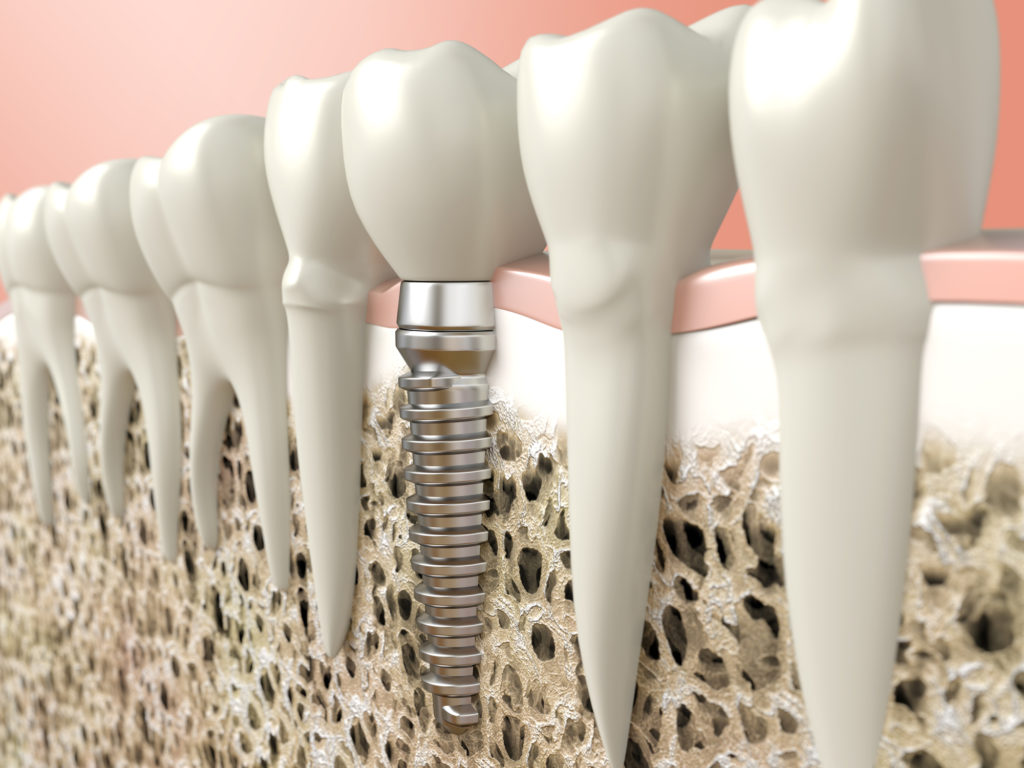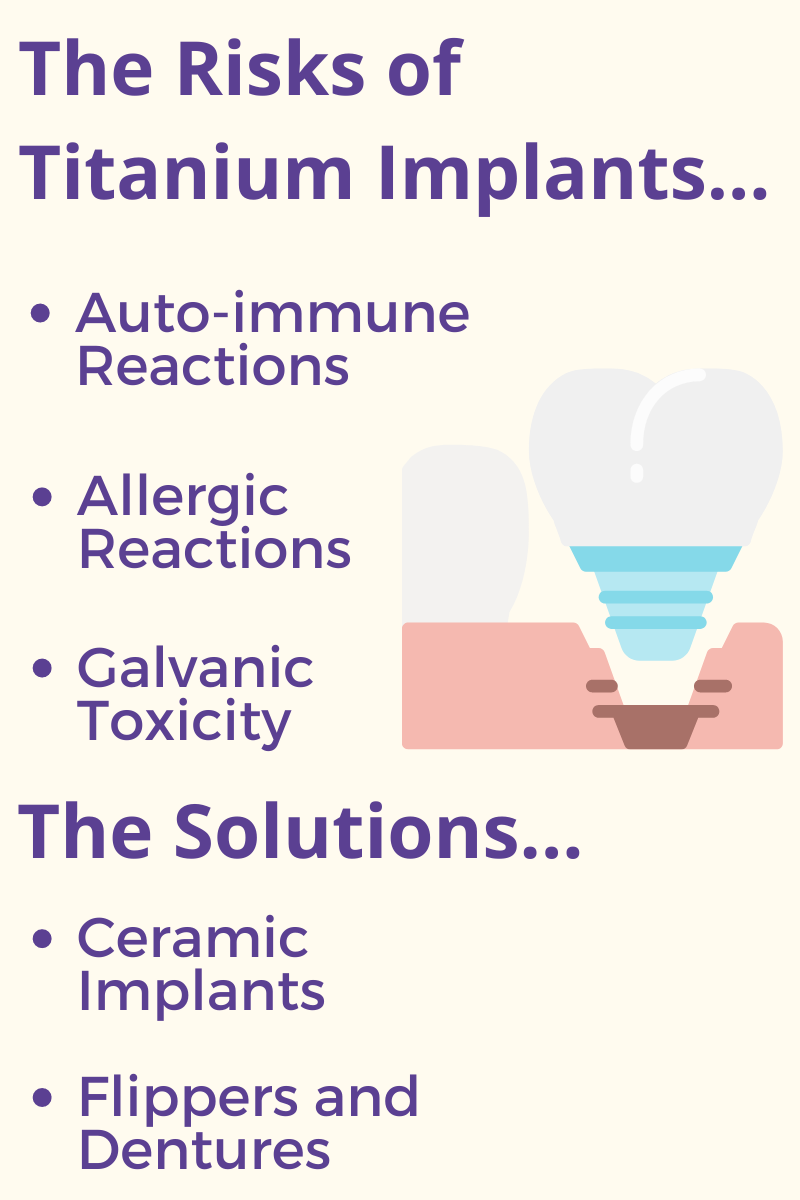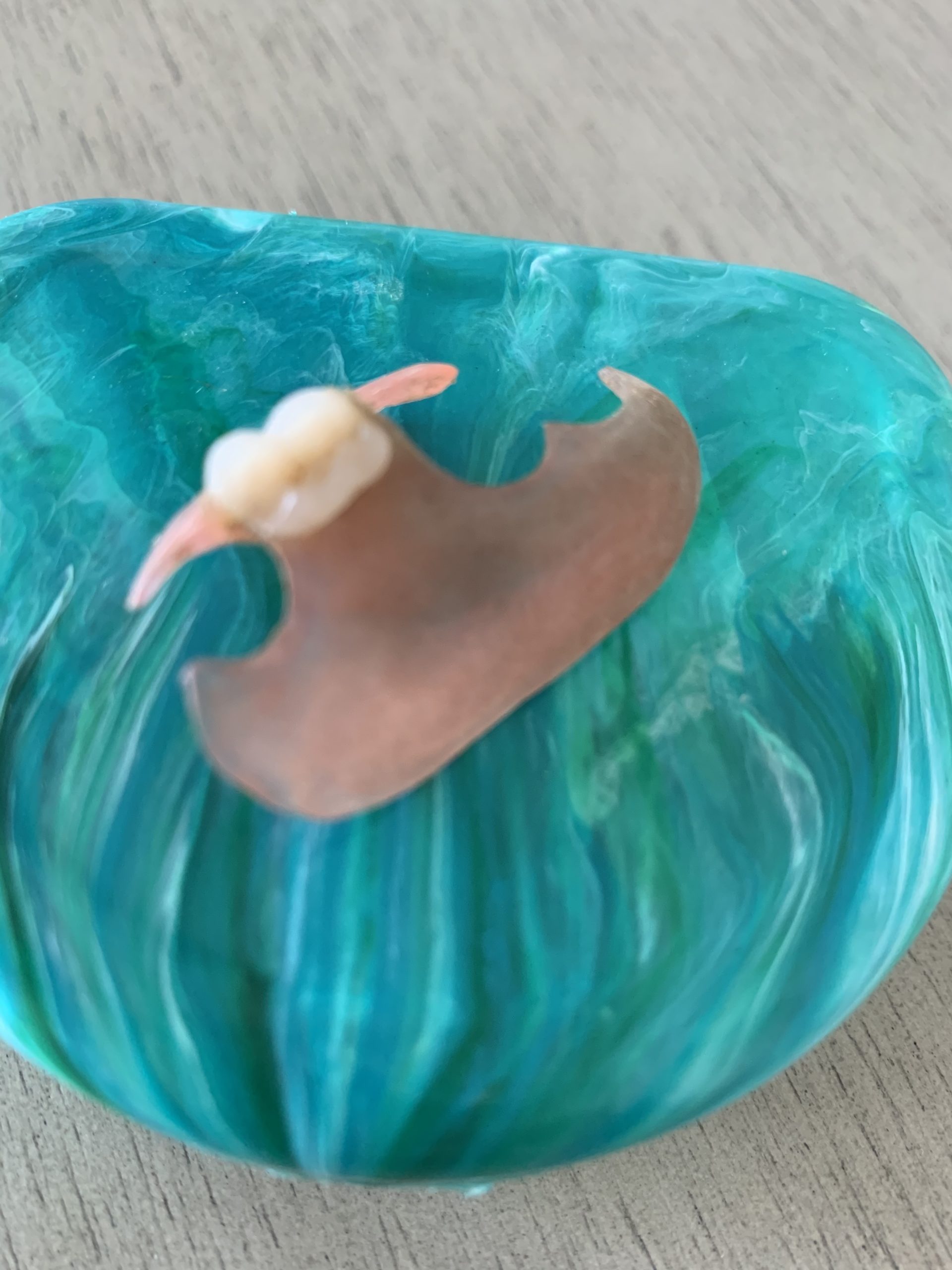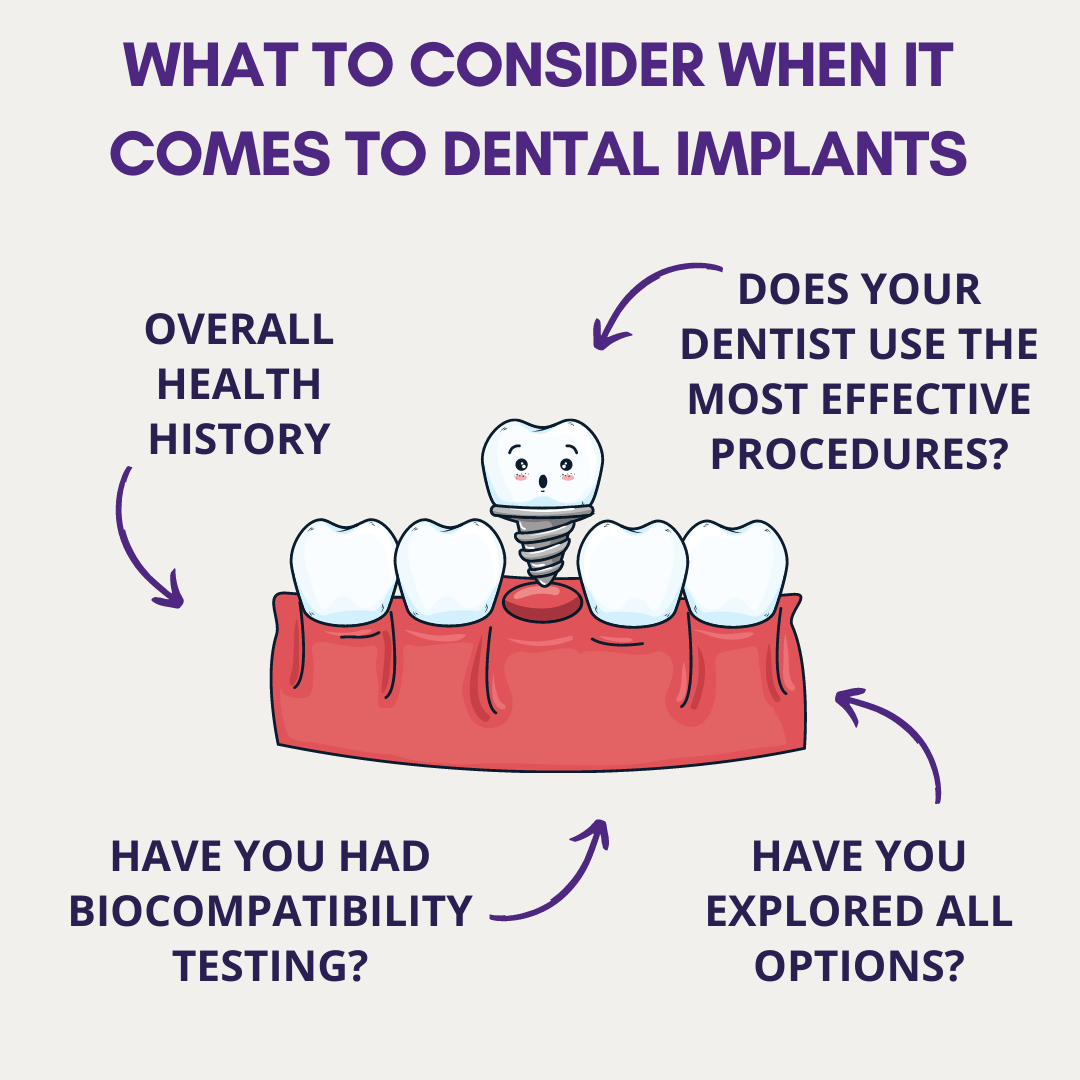
According to Eastern Medicine, every organ in your body is connected to a a tooth through the Acupuncture Meridian System. This is one of the reasons why so many women develop breast cancer on the same side of their body as a root canal, cavitation, or other kinds of dental issues. Of course, more and more people are becoming aware of this connection. But after the infected tooth or amalgams have been replaced, what then? Many people opt for metal implants to fill the gap, but is this the safest choice for you?
Dental Implants Fill in Missing Teeth
The main reason why most people would get implants may seem pretty obvious. Who wants a gaping hole where a tooth should be?
“We see ourselves, and others see us, in terms of the face we present to the world,” write the authors of the 2000 Surgeon General’s Report on Oral Health. “Diminish that image in any way and we risk the loss of self-esteem and well-being.”
In actuality, the social and emotional consequences of missing teeth often extend beyond image to affect income level and social relations as well. The American College of Prosthodontists estimates that roughly 120 million Americans are missing at least one tooth.
Missing teeth can affect physical health as well. Gaps between teeth make it more difficult to chew food. This can affect proper digestion since the first step is actually the breakdown of food by chewing and mixing key oral cavity enzymes with saliva.
Missing teeth can also transform the very structure of the mouth and jaw area, giving way to issues in the head, neck, and sinuses. Bone loss can occur in the jaw area and other teeth can shift as a result of the gap. This can cause malocclusion (i.e. improper bite) and even affect speech.
 The Problems with Metal Implants
The Problems with Metal Implants
Both conventional and holistic dentists typically recommend implants as the next step after extraction for most people. Most conventional dentists will suggest titanium metal implants because of popularity as well as cost.
The choice to go with metal implants is yours, of course. The point of this article is to equip you with some basic information so that the choice you make is an informed one!
For me personally, I would NEVER have a dental implant screwed into my jaw bone. I wrote in the 2nd edition of my book Heal Breast Cancer Naturally:
“Think about the implications of that procedure. First of all, the metals used in dental implants can be a hodgepodge of metals such as titanium, nickel, chromium, zirconia, aluminum, vanadium, etc. Many people have allergic reactions to metals implanted into their bodies. Secondly, the implant is drilled into your jawbone, often causing severe infections, nerve damage, and chronic pain.”
Let’s dive a little deeper into the risks of mostly-titanium implants:
#1 Allergic Reactions to Titanium
At present, about 4% of the U.S. population has some form of allergic reaction to titanium. The best way to find out if you have an allergy or intolerance to this metal, in particular, is to have the MELISA test done. MELISA stands for Memory Lymphocyte Immunostimulation Assay. MELISA can not only detect if an allergy is present. It is also able to determine the severity of the allergy.
If you are considering titanium implants, getting the MELISA test could be a life-saver. Also, keep in mind that titanium implants don’t just contain titanium. This metal may be the main ingredient but some implants may also contain other metals such as the ones mentioned above.
Be sure to do run a Serum Compatibility Test to determine what materials can be safely used in your mouth. This is likened to an “allergy” test for dental substances. BioComp Labs is one of many labs that specialize in testing sensitivity to dental materials.
Individuals who are allergic to metals are at a higher risk of being allergic to titanium, according to a 2010 French study. In many cases, allergy symptoms such as depression, headache, cognitive disorders, digestive disorders, and chronic fatigue syndrome disappear as soon as the implants are removed.
#2 Autoimmune Reactions in General
According to the National Institute of Environmental Health Sciences, an estimated 24 million Americans currently have a diagnosed autoimmune condition. An additional eight million people have “autoimmune antibodies,” a major risk factor for developing one or more of the close to 100 different kinds of autoimmune conditions discovered by science thus far (including diabetes and rheumatoid arthritis).
Many individuals who already have an autoimmune condition react adversely to metal implants (or any kind of metal ). This may be because of a developed metals allergy outright, or it may be caused by the body’s rejection of any kind of foreign material. This means that the body of people with autoimmune disease may reject any non-organic substance drilled into the jawbone, including ceramics. We will talk about this option in the next section.
In general, according to conventional literature, the “success rate” of implants amongst those who don’t have autoimmune conditions is roughly 98%. “Success” in studies such as one conducted by the University of Iowa is measured by the absence of reactions to the materials within one year of putting in the implants. Since inflammation, infection, allergy and other symptoms are more prevalent amongst those with autoimmune conditions, the success rate as defined by conventional doctors may be significantly lower.
Finally, there are some autoimmune conditions that research has indicated can be traced directly or indirectly to the insertion of the implants themselves. According to a report put out by the International Academy of Oral Medicine & Toxicology, Multiple sclerosis, Systemic lupus erythematosus (Lupus), Fibromyalgia, Rheumatoid arthritis, and Crohn’s disease have all been traced to metal implants by current research.
#3 Galvanic Toxicity
“Galvanic Toxicity” is based on the subtle electrical currents that are happening all the time all over your body. The term may be new for you, but Galvanic Toxicity is actually becoming increasingly common.
This kind of toxicity is what happens when a person’s saliva reacts with the metal in the oral area. The metal can cause surges of electricity which can throw off the regular, healthy flow. The result is a myriad of symptoms caused by overstimulation of the brain. Symptoms may include mild to severe headaches, anxiety, cognitive disorders, a metallic taste in the mouth, and a “zinging” feeling (or electrical charge) when using metallic utensils for eating and drinking.
Galvanic toxicity may sound a little far-fetched or “woo-woo,” but it is a real condition based on documented electrical currents in the body. In fact, some experts say that any kind of foreign substance– including infection-inducing pathogens such as those that cause cavitation or those that stem from a root canal– can cause an “interference field” in the body or a near-total blockage of the bioelectric flow.
An interference field is an “inflammatory process at a specific point in the body [which can] can provoke a response at another and, in doing so, cause chronic complaints,” according to Dr. Ulrich Volz, a leader in non-titanium dental implant methods and founder of Swiss Dental Solutions.
For more information about Galvanic Toxicity and solutions for remedying it, including SMART amalgam removal, be sure to check out my recent podcast interview with Dr. Stuart Nunnally HERE.
What About Solutions?
It should be clear by now that inserting metal (i.e. titanium or titanium-based composite) implants is truly the least desirable choice for those who are wanting to fix their smile and at the same time stay safe on their health journey. Don’t despair, however! There ARE alternatives, such as:
Ceramic Implants
The other implant-based option would be zirconia-based ceramic implants. I mentioned above that those with autoimmunity may potentially have a higher risk of rejection of any kind of foreign material in the mouth. This would go for ceramic materials as well, for some individuals. Also, keep in mind that the procedure for inserting the implant is basically the same. You are placing the implant into the jawbone, increasing the chance of infection whether you currently have an autoimmune condition or not.
On the other hand, there are procedures and materials that are less reactive than others. The state of the art when it comes to non-metal implants is a material called zirconia. Zirconia, or zirconium dioxide (ZrO2), is a ceramic-based form of the mineral baddeleyite and is chemically derived from zircon. It is used in lieu of titanium by many holistic dentists because it is a very stable, strong mineral that is known for its biocompatibility in the human body. This is good news since using Zirconia can lead to less inflammation and more integration of the material for more people, including those with autoimmunity. It is also durable and can stay white in the mouth, despite exposure to staining substances. According to some research, ceramics also have “low plaque affinity.”
One of the pioneers of zirconia implants is Dr. Ulrich Volz of Swiss Dental Solutions (SDS) mentioned above. Dr. Ulrich is unique since he has developed a technique of inserting the implant immediately after extraction in most people.

“SDS implants allow me to perform the implantation immediately the following extraction with an incredibly high success rate and place fixed temporary restorations during the same session, without the need for a second appointment (all-in-one concept),” states Dr. Ulrich on his website. To date, he has personally completed or overseen more than 20,000 implant procedures in this way.
Flippers and Dentures
Another option is to bypass implants altogether and use a denture or “flipper” instead. A flipper also called a partial denture, fits over and around existing teeth to fill in gaps.
One drawback to dentures and flippers is an inconvenience. Often dentures do not fit properly or they may become loose or shift over time as you age. This can lead to issues with mastication and chewing and corresponding digestive issues.
The advantages of dentures and flippers may outweigh the drawbacks, especially for those with autoimmunity. There is way less initial trauma and there is no drilling into the jawbone. There is also no chance of metal or ceramics-related rejection or reaction and way less chance of infection.
The key to success when it comes to dentures and flippers is to connect with a holistic dentist or another specialist in the area who can create the perfect fit for you. You also may want to consider biocompatibility testing for the resin materials that the dentist will use to make the actual denture. Like implants, some denture materials are safer than others. Some materials may be more prone to staining than others as well.
Your Dental Health Matters on Your Breast Cancer Journey
 Part of your dental health journey is connecting with a holistic dentist in your area who understands the importance of safety and strictly adheres to biological dental practices. Finding such a professional and making that first appointment is your job. Giving you the best possible holistic dental care, using natural yet effective modalities for the health of the whole body, and always putting safety first is the job of the holistic dentist you are going to trust your oral health (and your total health) too!
Part of your dental health journey is connecting with a holistic dentist in your area who understands the importance of safety and strictly adheres to biological dental practices. Finding such a professional and making that first appointment is your job. Giving you the best possible holistic dental care, using natural yet effective modalities for the health of the whole body, and always putting safety first is the job of the holistic dentist you are going to trust your oral health (and your total health) too!
This is especially true when it comes to dental implants. Make sure that your holistic dentist:
-knows your overall health history and situation.
-offers biocompatibility testing.
-gives you options other than implants.
-uses the most effective and the safest procedures for removal of amalgams and the insertion of the implants.
When It Comes to Dentistry, Finding the Right Practitioner is KEY!
For some parts of your health journey, you can not only do your own research, but you can also put into practice your own solutions too. Whether it is changing your diet, taking key supplements, or choosing other modalities such as an infrared sauna or coffee enema, you have a LOT of control over many aspects of your health journey.
For other parts of your health journey, you must connect to a qualified professional. This is definitely the case when it comes to your oral health. You must research the pros and cons of each procedure and make the choice to invest both time and money into rectifying procedures from the past such as root canals and amalgams. Then it is up to you to connect with a biological dentist that is going to provide the best advice regarding implants and every step of your dental health.